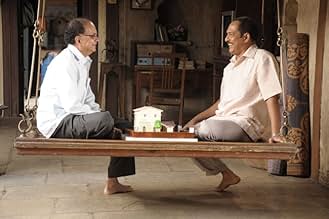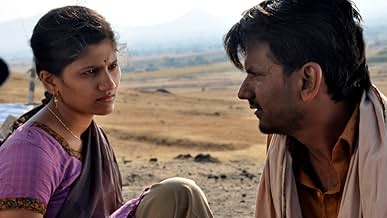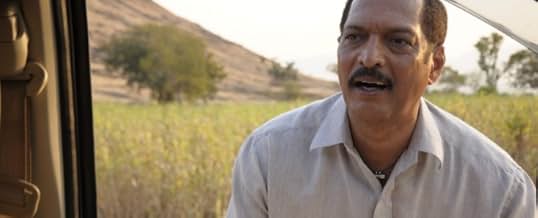IMDb-BEWERTUNG
8,2/10
1811
IHRE BEWERTUNG
Füge eine Handlung in deiner Sprache hinzuKeshya, a simple villager believes that god has arrived in his village but everyone disbelieves him. Later when the politics plays its part things take a drastic change.Keshya, a simple villager believes that god has arrived in his village but everyone disbelieves him. Later when the politics plays its part things take a drastic change.Keshya, a simple villager believes that god has arrived in his village but everyone disbelieves him. Later when the politics plays its part things take a drastic change.
- Regie
- Drehbuch
- Hauptbesetzung
- Auszeichnungen
- 3 wins total
Dilip Prabhawalkar
- Anna Kulkarni
- (as Dilip Prabhavalkar)
Empfohlene Bewertungen
A fine movie with great direction and cinematography. Touches on the topic of God and faith so beautifully. Must watch to realize one should have faith in religion and god but not be so blinded by it that one begins to lose the moral compass
I had bookmarked Deool on Primevideo. Got around to watching it last night in orig. Marathi w/Eng. Subs.
Deool deserves to be ranked as a Marathi film political classic, ahead of its time. The stellar cast and in fact every actor deliver their respective characters as though to the manor born.
A nondescript village (Mangrul) in what looks very much like a sweeping Satara-esque landscape albeit overgrazed and barren, is the location for this film.
A scruffy looking young man Keshya (Girish Kulkarni) on the lookout for his cow Karde, rests in the shade of a solitary tree. He is startled out of his sleepy reverie with a vision of the three headed Lord Dattatreya. Convinced that it is for real, Keshya races back to his village to announce his revelation. Some in the village are convinced, others take a more rational approach such as the respected Anna (Dilip Prabhavalkar) who assures Keshya that his faith may well have allowed him a vision of his God but it would be better to be quiet about it. The local politician Bhau (Nana Patekar) is encouraged by his MLA boss (Mohan Agashe) to seize this opportunity and make hay while the sun shines. Bhau aided by his supporters - a motley bunch of typical local characters superbly essayed by their respective actors , the lady sarpanch, Bhau's wife, Keshya's girlfriend, the village bhajan mandal and most others, make political and economic capital by building a fancy temple to Lord Dattatreya on the hillock next to the tree where Keshya had his vision, with a special enclosure for the 'holy cow' Karde. They auction the stalls lining the now well paved path to the temple. To cut a long story short, the temple is profitably commercialised; the entire village 'develops' and prospers, making a lot of money with an endless stream of pilgrims coming from far and wide. Mangrul has indeed arrived as a "Sacred" place on the pilgrimage circuit.
The idealistic Anna is disappointed as Bhau chose the temple for political gain instead of the promised hospital project and leaves the village for good. Mohan Agashe and Bhau rise politically. One day, Karde the cow falls ill and soon passes away. Keshya is heartbroken, inconsolable and disillusioned. He steals the idol of Dattatreya and runs away from the village, immersing his God in a far off river before returning home. Nasiruddin Shah appears in a blink and miss moment as a North Indian dacoit taking momentary refuge in some archaeological ruins on the outskirts of Mangrul. He is grateful to Keshya for giving him water.
The last frames show the hugely successful politicians and their supporters leading a huge crowd of pilgrims on a march to the top of the hillock and installing a new flashy idol of Lord Dattatreya .......
The characters are quite real, the story very convincing as indeed several such examples of commercially profitable Sacred places all over India reveal. The shrewd political sub plot is well played, as are the various relationships.
The movie is slow in parts, but other than that it is a well crafted film and deserves much wider publicity with multi language subtitling.
Deool deserves to be ranked as a Marathi film political classic, ahead of its time. The stellar cast and in fact every actor deliver their respective characters as though to the manor born.
A nondescript village (Mangrul) in what looks very much like a sweeping Satara-esque landscape albeit overgrazed and barren, is the location for this film.
A scruffy looking young man Keshya (Girish Kulkarni) on the lookout for his cow Karde, rests in the shade of a solitary tree. He is startled out of his sleepy reverie with a vision of the three headed Lord Dattatreya. Convinced that it is for real, Keshya races back to his village to announce his revelation. Some in the village are convinced, others take a more rational approach such as the respected Anna (Dilip Prabhavalkar) who assures Keshya that his faith may well have allowed him a vision of his God but it would be better to be quiet about it. The local politician Bhau (Nana Patekar) is encouraged by his MLA boss (Mohan Agashe) to seize this opportunity and make hay while the sun shines. Bhau aided by his supporters - a motley bunch of typical local characters superbly essayed by their respective actors , the lady sarpanch, Bhau's wife, Keshya's girlfriend, the village bhajan mandal and most others, make political and economic capital by building a fancy temple to Lord Dattatreya on the hillock next to the tree where Keshya had his vision, with a special enclosure for the 'holy cow' Karde. They auction the stalls lining the now well paved path to the temple. To cut a long story short, the temple is profitably commercialised; the entire village 'develops' and prospers, making a lot of money with an endless stream of pilgrims coming from far and wide. Mangrul has indeed arrived as a "Sacred" place on the pilgrimage circuit.
The idealistic Anna is disappointed as Bhau chose the temple for political gain instead of the promised hospital project and leaves the village for good. Mohan Agashe and Bhau rise politically. One day, Karde the cow falls ill and soon passes away. Keshya is heartbroken, inconsolable and disillusioned. He steals the idol of Dattatreya and runs away from the village, immersing his God in a far off river before returning home. Nasiruddin Shah appears in a blink and miss moment as a North Indian dacoit taking momentary refuge in some archaeological ruins on the outskirts of Mangrul. He is grateful to Keshya for giving him water.
The last frames show the hugely successful politicians and their supporters leading a huge crowd of pilgrims on a march to the top of the hillock and installing a new flashy idol of Lord Dattatreya .......
The characters are quite real, the story very convincing as indeed several such examples of commercially profitable Sacred places all over India reveal. The shrewd political sub plot is well played, as are the various relationships.
The movie is slow in parts, but other than that it is a well crafted film and deserves much wider publicity with multi language subtitling.
I normally don't write movie reviews, but after watching this movie I was compelled to write one because this movie is a masterpiece. This movie nicely depicts village life in India where people are blindly following modern lifestyle without considering its negative effects. And importantly it shows how the politics and God's business is combined by few for material gains. It also shows peoples obsession with putting their kids in English medium schools. Movie also shows how there is no point in providing reservations based on gender as ultimately males only try to dominate. As in this movie there is a women Sarpanch 'head of village council', but she is under complete dominance of local male leader. Overall this movie does a good job in showing how the socioeconomic scenario is changing in Indian villages. Actors have done a good job, even led character got national award of 'Best actor'. This is a must watch movie.
It's a masterpiece cinema from umesh kulkarni and team. Superb acting, dialogues, screenplay, and cinematography. This movie shows the reality of every innocent religious people and also depicts about how religion is being commercialized in name of god.
Being an indian and maharashtrian person brought up surrounded by such religiious places I can totally relate myself to this story. The way Umesh has displayed his perspective definitely syncs with me.
Perfect vision of how religion has become a business and how they play with people's mind.
Must watch for people who are blindly religious
Wusstest du schon
- WissenswertesBefore the temple is constructed Nana Patekar has a Mahindra Bolero (MUV) where in the numbers as disguised as "Bhau" in Marathi. After the village becomes prosperous he upgrades to Mahindra Scorpio (SUV) with the same number plate.
Top-Auswahl
Melde dich zum Bewerten an und greife auf die Watchlist für personalisierte Empfehlungen zu.
- How long is Deool?Powered by Alexa
Details
Box Office
- Budget
- 47.500.000 ₹ (geschätzt)
- Laufzeit2 Stunden 15 Minuten
- Farbe
Zu dieser Seite beitragen
Bearbeitung vorschlagen oder fehlenden Inhalt hinzufügen
































